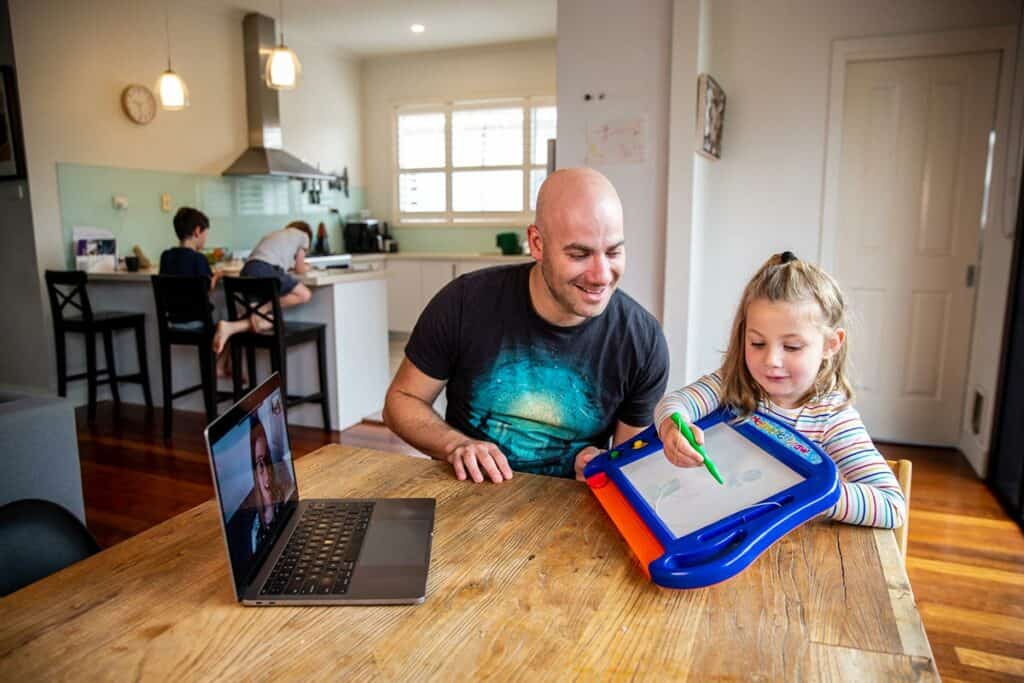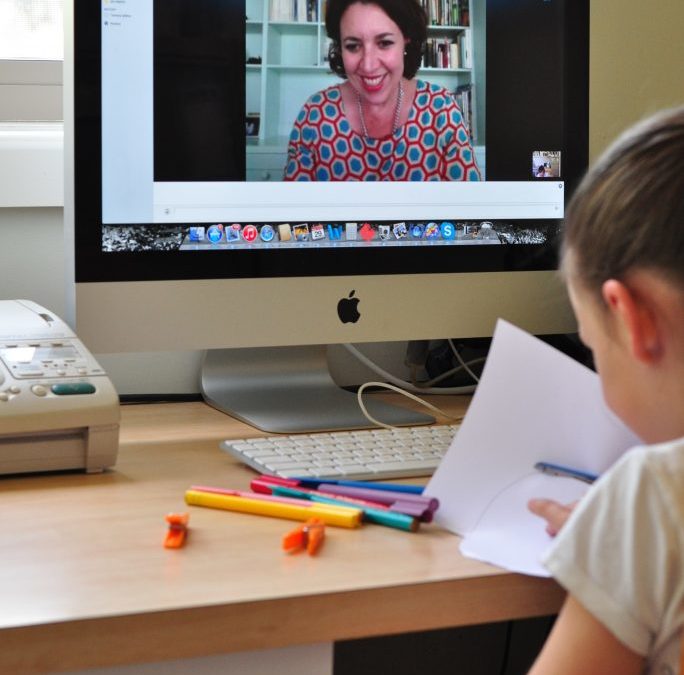According to Speech Pathology Australia, around one in five children start school with a speech, language, or communication problem that impacts their ability to access the curriculum, participate, and achieve at school.
At Therapy Connect, our team of highly qualified and experienced speech pathologists work with clients of all ages – from infants to elderly people. As we play such an important role in the lives of many of our clients, we thought it would be helpful to share some insights into the role of speech therapists.
Understanding the Basics: What is Speech Therapy?
Speech therapy is a specialised field within healthcare that focuses on diagnosing, treating, and preventing communication and swallowing disorders. These disorders can encompass a wide range of challenges, from difficulties in articulation and fluency to voice disorders and language delays. Speech therapists work with individuals across all age groups, from infants to the elderly, addressing a diverse spectrum of communication needs.
The Skills Required for a Speech Therapist
Communication Skills: Unsurprisingly, effective communication skills are fundamental for speech therapists. As a speech pathologist, you need to convey complex concepts in simple terms to clients and their families, fostering understanding and cooperation.
Empathy and Patience: Many individuals seeking speech therapy are facing challenges that can be frustrating and emotionally taxing. Speech therapists approach their clients with empathy and patience, creating a safe and supportive environment.
Problem-Solving Abilities: Every client’s situation is unique, and speech therapists must be adept at identifying the root causes of communication disorders and developing innovative strategies to address them.
Adaptability: Flexibility is essential, as therapy plans may need to be adjusted based on individual progress, changes in the client’s condition, or shifts in the client’s environment.
Clinical Knowledge: A strong foundation in anatomy, physiology, linguistics, and psychology is necessary to understand the intricacies of communication and swallowing disorders.
Interdisciplinary Collaboration: Given the interdisciplinary nature of healthcare, the ability to work effectively with other professionals is crucial for providing holistic care to clients.

Educational Path to Becoming a Speech Therapist
Becoming a speech therapist is not easy for a good reason. We want our speech therapists to have been through education and training before taking on such an important role. Education includes:
- Bachelor’s Degree: Begin by obtaining a bachelor’s degree in communication sciences and disorders or a related field. This degree provides foundational knowledge in language development, anatomy, and linguistics.
- Master’s Degree: A master’s degree in speech pathology is typically required for entry into the profession. This graduate program delves deeper into assessment, diagnosis, treatment techniques, and clinical practice. It includes both classroom instruction and hands-on clinical experience.
- Clinical Fellowship: After completing the master’s program, aspiring speech therapists must complete a clinical fellowship, which is a supervised period of professional practice. During this time, they gain valuable experience under the guidance of a licensed speech therapist.
Decoding the Roles and Responsibilities of a Speech Therapist
At the heart of it all, speech therapists empower individuals to communicate to the best of their ability. Here’s a detailed look at their multifaceted job responsibilities:
Assessment and Diagnosis:
The journey begins with a comprehensive assessment of a client’s speech and language abilities. Speech therapists utilise various standardised assessments to identify speech disorders, language delays, and other communication challenges. Through this process, we identify the needs and goals of each individual client, and this process forms the foundation for tailoring a personalised therapy plan.
Developing Individualised Treatment Plans:
Just as every individual is unique, so are their speech therapy needs. Speech therapists create a tailored therapy plan to meet the needs and goals of each individual. These plans are designed to target specific needs, goals and areas of concern. The tailored plan will incorporate exercises, activities, and techniques that align with the needs and goals of the individual client.
Speech and Language Therapy:
Speech therapists use engaging activities to support clients with improving speech sounds, articulation, voice modulation, fluency, and language skills. We employ various engaging tools, from tongue twisters to storybooks, to make therapy sessions effective and enjoyable.
Swallowing and Feeding Therapy:
Speech therapists are not just about words; we support individuals with swallowing and feeding difficulties. From infants struggling with breastfeeding to adults recovering from surgeries or neurological conditions, speech therapists play a vital role in ensuring safe and efficient swallowing mechanisms.
Collaboration and Counselling:
At Therapy Connect, our speech therapists work closely with families, caregivers, teachers, and other healthcare professionals to ensure our clients receive a comprehensive approach to care. As an online therapy provider, we can easily include members of the family in our sessions, offering guidance, support, and counselling to help these individuals better understand the individual needs our clients and how to contribute to their progress.
Adapting and Evolving:
Every success story is different, and speech therapists are skilled at adapting their strategies based on each client’s progress. We continuously evaluate the effectiveness of therapy plans and make necessary adjustments to achieve optimal outcomes.

The Remarkable Influence of Speech Therapists
The impact of speech therapists extends far beyond improving communication abilities. We can enhance the quality of life for individuals with communication challenges by helping them to build self-esteem.
Building Confidence:
Being able to communicate to the best of your ability is important for building self-esteem. After all, it’s through communication that we share our thoughts, feelings, and needs. So helping our clients to improve their communication helps build confidence, and this is an incredibly satisfying part of the job.
Embracing Unique Communication Styles:
At Therapy Connect, we practice neurodiversity-affirming speech therapy, which focuses on strengths. Our clients may have a unique way of communicating their feelings and thoughts and we offer strategies to help them communicate more effectively and education for their family on how to communicate effectively with them. We know that when we feel understood, it can alleviate negative emotions and contribute to a more positive self-image.
Facilitating Self-Advocacy
Speech therapy encourages children to be their own advocates, teaching them to voice their needs and wants. By being able to ask for help, express discomfort, or share their desires, children are given a sense of independence and control over their own lives, which builds confidence.
Why Choose Therapy Connect for Speech Pathology Services?
Expertise at Your Fingertips: At Therapy Connect, our team of speech pathologists have an average of 10 years of experience and they’re handpicked for their proficiency and passion.
Tailored to Your Needs: We recognise that every client is unique and that’s why we tailor therapy to every individual’s needs and goals.
Convenience Redefined: Save time and money on travelling to and from therapy. Therapy Connect brings therapy to you so you can access the highest quality services from the comfort of home.
Powered by Technology: Therapy Connect is an online provider which means we use video calls for all our therapy sessions and with the help of interactive tools and apps, we make sessions engaging.
Family-Centred Approach: Therapy Connect believes in the value of having families and caregivers involved so that our clients have a supportive environment that fosters continuous improvement.
No waitlists: While you’ll wait 6 to 9 months for traditional face-to-face NDIS services, at Therapy Connect, we have no waitlists for speech pathologists.
Speech pathologists are dedicated to helping people to communicate to the best of their ability and build confidence for individuals facing communication challenges. With Therapy Connect, speech therapy is not only accessible faster with no waitlists but it’s available from wherever you live in Australia.




